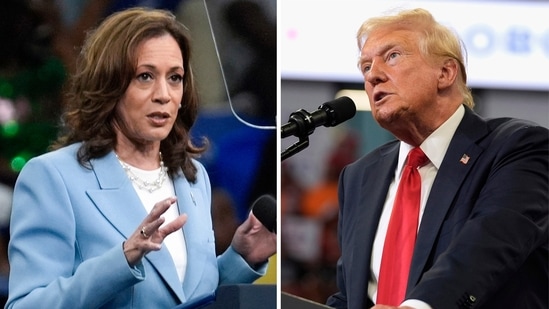Without waiting for the opening bell, Donald J. Trump accused Vice President Kamala Harris of being behind Monday’s market sell-off.
Mr. Trump made no mention of the fact that during his presidency, markets had experienced much larger one-day losses, or that analysts attributed Monday’s decline to a number of reasons, such as a dismal jobs report from July, a sharp decline in Japanese markets earlier in the day, and an increasing body of opinion among investors that the Federal Reserve has been holding off on raising interest rates for too long.
He also failed to disclose that earlier in the year, he had taken credit for a spike in stock prices, citing them as evidence of his confidence in winning reelection.
Mr. Trump was making a deliberate effort to sell his political brand. Less than an hour after U.S. markets started on Monday at 9:45 a.m., Mr. Trump dubbed the S&P 500’s eventual 3 percent daily fall the “Kamala Crash.”
By midday, the official party line was taking shape. The Republican National Committee extolled the virtues of the “Great Kamala Crash of 2024,” while the Trump team had created and shared a social media video linking the vice president to the market decline on Monday. The Trump team managed to make “KamalaCrash” a “trending” topic on X by the afternoon.
The concerted effort highlighted Mr. Trump’s long-standing obsession with stock indexes as a gauge of the state of the economy and even as a stand-in for polls as an indicator of his own popularity and performance. However, markets are subject to daily dramatic fluctuations; following significant losses on Monday, the Japanese stock exchange saw a spike in early trade on Tuesday.
It also reaffirmed the extent to which economic messaging and the state of the economy will be crucial factors in the race for president in November.

A representative for Harris’ team, Ammar Moussa, retorted, “What middle-class families need is steady economic stewardship, not chaotic ranting lies.” Donald Trump spent his presidency enriching the wallets of his wealthy pals who outsourced American jobs, and he had the poorest employment record of any contemporary president. He also presided over some of the worst stock market days in history. Experts in economics concur that his proposals would “supercharge inflation” and increase expenses for working households by $2,500 annually.
In her talks, Ms. Harris has emphasized economic optimism. She presents a positive picture of the economy and attempts to paint Mr. Trump’s policy proposals—such as higher import taxes—as a danger to economic expansion and a potential catalyst for a downturn.
She declared last week in Houston, “We believe in a future that keeps America’s economy the strongest in the world.” “Where everyone has the chance to establish intergenerational wealth, own a home, and build a business.”
Pollsters are frequently told by American voters that the nation’s most pressing problems are the state of the economy and consumer prices. Both Mr. Trump and Ms. Harris, the Democratic nominee, are attempting to persuade voters of diametrically opposed views of the state of the economy.













